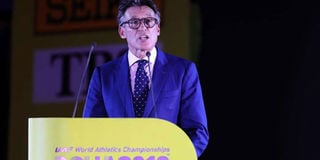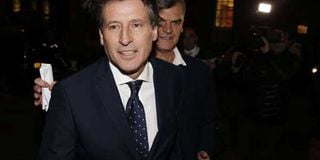Seb Coe: Athletics must be more innovative post-coronavirus
What you need to know:
- World Athletics President sees the unpredictable Covid-19 pandemic as an opportunity for athletics organisations to innovate and think differently around how they organise various competitions
Athletics is staring at the possibility of losing half - or possibly the entire - of its 2020 international season, following the current global coronavirus lockdown.
Already, six Diamond League meetings have been called off, with several other lower-tier competitions, including the inaugural Continental Tour, also postponed.

IAAF's president Britain's Sebastian Coe sspeaks during the opening ceremony at the 2019 IAAF World Athletics Championships at the Corniche in Doha on September 27, 2019. PHOTO | KARIM JAAFAR |
The much trumpeted showdown between the world’s two fastest marathon runners – Kenya’s Eliud Kipchoge and Ethiopia’s Kenenisa Bekele – was also thrown into the back burner after the April 26 London Marathon was pushed to October 4 denying fans a mouth-watering duel.
But, principally, the Tokyo Olympic Games, initially scheduled for July 24 to August 9, have also been pushed to next year, throwing the global sporting calendar headstrong into a whirlwind.
With thousands of elite athletes, especially Kenyans, earning their livelihoods through these one-day meetings, along with the road races, World Athletics officials hope they can salvage at least half the season, banking on a speedy return to normalcy as the unpredictable Covid-19 pandemic continues to bite.
World Athletics President Seb Coe sees this unfortunate scenario as an opportunity for soul-searching, and for athletics to become innovative.
In a teleconference on Friday night that touched on a wide range of issues, Coe highlighted World Athletics’ main focus as being four-fold, principally: “getting our athletes back into competition as soon as possible, once it is safe to do so; expediting current review of the Olympic qualification system and releasing any changes to the process as soon as possible so athletes know where they stand; re-organising the global calendar of events, not just for the next two years which will see some major disruptions, but for the long term and continuing to develop our strategy to grow athletics.”

International Association of Athletics Federations president Sebastian Coe attends a presser following a meeting of the body's council in Doha ahead of the World Championships on September 23, 2019.
INNOVATE AND THINK DIFFRENTLY
Key among Coe’s observations on Friday night was also the need for athletics organisations to innovate and think differently around how they organise various competitions.
World Athletics maintain they have made it a priority and are doing everything possible “to salvage at least a shortened international season this year, where athletes can compete and earn money.”
Coe sees the social distancing enforced by the fight against the coronavirus, after all, as an avenue to look at things more creatively.
“We have the chance to think bigger, to rip up the blueprints and banish the ‘that’s the way we’ve always done it’ mentality,” Coe explained in a statement that followed Friday’s teleconference.
“Ironically, I believe social distancing will actually bring us closer together as a community and sport can sit right at the centre.
“The situation the world finds itself in today is a huge wake-up call for all of us – as human beings, as businesses and as sport.
“We should capitalise on this and work out new ways of delivering events, create and plan new events that embrace the many as well as the few.
“We can use this time to innovate and extend our sport across the year.”
The World Athletics supremo suggests that rather than the current athletics staple of on one-day meetings, road races and championships, thought should be given to “weekend festivals of running, jumping and throwing that take advantage of the Southern and Northern Hemisphere seasons.”

IAAF President Sebastian Coe (left), arrives for a meeting in central London on November 9, 2015. PHOTO | IAAF
Coe believes co-operation with governments, more vibrant club structures and incentives for people to keep fit should be the “new normal.”
“We’re going to have to need to re-engineer our lives. We should capitalise on this and work out new ways of delivering events, create and plan new events that embrace the many as well as the few. We can use this time to innovate and extend our sport across the year,” he said.
Coe described the International Olympic Committee’s decision to reschedule this year’s Tokyo Olympic Games to next year owing to effects of the coronavirus pandemic, as one “the athletes want.”
“And we believe this decision will give all athletes, technical officials and volunteers some respite and certainty in these unprecedented and uncertain times.
“The focus of us all must be on the health and well-being of ourselves, our families and our communities.
“And hard as this is for us in sport to say, sometimes sport needs to take a back seat.
“We will continue to do whatever we can to preserve and create an outdoor season of one-day meetings in 2020, starting and ending later than usual, so athletes, when they are able and it is safe, will have access to competitions in every region.”
The challenge facing World Athletics and indeed other international federations is re-jigging the international calendar.
With the Olympics shifted to next year, there a possibility of the World Athletics Championships, initially scheduled for August in US city Eugene’s new Hayward Field Stadium, moving to 2022, a year that also has the Commonwealth Games (Manchester).
And then there’s the World Cross Country Championships, also next year, in Australia.
“The decision that was taken (to postpone the Olympics) was an important one and now we are looking at the reconfiguration of the jigsaw puzzle and the complexity of our global international calendar in our sport and in other sports.”
Coe clarified that athletes who have already qualified for the Olympic Games, initially to run in July and August, will remain qualified as the federation works out ways of kick-starting whatever will be left of the season.
The World Athletics’ qualification system is two-fold, based on world rankings on one hand, and on individual performance on the other.
“Athletes in the athletes’ commission want to see competitions like the Continental Tour up and running because for them that’s a priority and they don’t want to be away from competition for too long,” he explained.
“We have great supporters in that landscape. We have great meeting directors, great organising committees across our various world championships.
“The Continental Tour is new but gaining a lot of ground very quickly and then we have our marathons and road events. We are willing to be very flexible.
“The clear message from all the stakeholders in our sport is we will do whatever it takes to get this up and running but it has to be done in a way that’s respectful to a number of things.
“One area is to expedite the review of the Olympic qualification system as soon as possible so that the athletes know where they stand.
“Our athletes who have already qualified will remain qualified but we do need a clear and fair process for those that have not qualified.”

This file photo taken on February 6, 2017 shows International Association of Athletics Federations (IAAF) President Sebastian Coe looking on during a press conference following the 208th IAAF Council meeting in Monaco. PHOTO | FILE |
The World Athletics President also had a stern warning to drug cheats in athletics: “I have a really clear message about this, that we are not in a test-free zone at the moment and that there’s no testing going on at the moment.
“The one thing that athletes need to remember and reflect on, if they have a little bit more time than they thought they had, is that if you take the World Anti-Doping Agency and the top national anti-doping agencies and of course the Athletics Integrity Unit, these are organisations that are on the top of their game.
“We’ve long since passed a metric that only judged our efficacy in this area as being how many tests you do. That’s a very old-fashioned way of looking at it.
“There’s more access to intelligence than we’ve ever had. If you take the Athletics Integrity Unit - that’s 17 to 20 people – at least five or six of them are international investigators and they spend their whole time looking at intelligence around all sorts of things.
“No athlete should think that they are in an environment where they are able to capitalize on anything taking place.”
Having been head of the 2012 London Olympic Games, Coe, from a human resources point of view, is sympathetic to the inconvenience visited on members of the Tokyo Olympic Games organising committee who will now have to endure another year of preparations for the rescheduled Games.
“Everywhere you look is complicated, but there’s one area I do hope people recognise: by the time you get to the end of that seven-year journey, your teams are running on empty, from the president right down to the organisation.
“I hope that there’s a recognition that there’s exhaustion subdued by massive disappointment. If I were president of an organizing committee under the same circumstances, I would look at how I could take some of that exhaustion away from the teams before they re-gather for yet another year of delivery.
“For me that would be uppermost in my concern at the moment – just managing the disappointment and the exhaustion all coming together in what could be a perfect storm.”
The world is waiting for the Tokyo organisers to announce the new date for the rescheduled Olympics which will be the starting point for calendar changes as world sports federations battle to salvage whatever will be left of the 2020 season.
“I wish Tokyo the best of luck. I’m bowled over by the quality of their organizing committee and I have no doubt at all they will deliver absolutely outstanding Games,” Coe assures.





